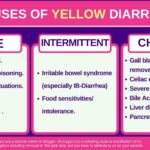7 Causes of Constant Loose Stool every day.
Our content is not intended nor recommended as a substitute for medical advice by your doctor. Use for informational purposes only.
What you need to know:
Chronic or recurrent loose stool every day or mild diarrhea is common. Most cases are due to food reactions and functional gut diseases.
The most common causes of constant loose tools daily are lactose intolerance, irritable bowel syndrome with diarrhea, FODMAP malabsorption, celiac disease, medications, etc.
The table below illustrates the common, infrequent, and rare causes of chronic loose stool or diarrhea (reference).
Common causes: |
| 1- IBS-diarrhea |
| 2- Bile acid diarrhea |
| 3- Diet: – FODMAP malabsorption – Lactase deficiency – Artificial sweeteners (e.g., sorbitol, xylol in chewing gum, soft drinks) – Caffeine (e.g., coffee, coke, energy drinks) – Excess alcohol – Excess liquorice |
| 4- Colorectal cancer |
| 5- Inflammatory bowel disease |
| 6- Celiac disease |
| 7- Drugs |
| 8. Recurrent Clostridioides (formerly Clostridium) difficile diarrhea |
| Overflow diarrhea |
Infrequent Causes: |
| – Small bowel bacterial overgrowth |
| – Mesenteric ischemia |
| – Lymphoma |
| – Surgical causes (e.g., small bowel resections, fecal – incontinence, internal fistula) |
| – Chronic pancreatitis |
| – Radiation enteropathy |
| – Pancreatic carcinoma |
| – Hyperthyroidism |
| – Diabetes |
| – Giardiasis (and other chronic infections) |
| – Cystic fibrosis |
Rare Causes: |
| – Other small bowel enteropathies (e.g., Whipple’s disease, tropical sprue, amyloid, intestinal lymphangiectasia) |
| – Hypoparathyroidism |
| – Addison’s disease |
| – Hormone-secreting tumors (VIPoma, gastrinoma, carcinoid) |
| – Autonomic neuropathy |
| – Factitious diarrhea |
| – Brainerd diarrhea (possible infectious cause not identified) |
Today we will discuss the most common causes that may cause constant loose stool or diarrhea every day:
1 . FODMAP intolerance.
FODMAP refers to Fermentable oligo-, Di-, Monosaccharides, and polyols. They’re a broad group of foods with short-chain sugar.
Short-chain sugars are rapidly fermentable inside your intestine. As a result, the bacteria inside your gut use this carbohydrate as a source of diet. However, too many FODMAPs can cause constant loose stool every day.
FODMAP intolerance is very common among people with Irritable bowel syndrome. However, it can present with mild digestive symptoms such as abdominal discomfort and loose stool without the complete picture of IBS.
The table below shows the most common FODMAPs(reference):
| Sugar type | Foods containing | ||
| F | Fermentable | ||
| O | Oligosaccharides | Fructans, galactooligosaccharides | Wheat, barley, rye, onion, leek, the white part of spring onion, garlic, shallots, artichokes, beetroot, fennel, peas, chicory, pistachio, cashews, legumes, lentils, chickpeas |
| D | Disaccharides | Lactose | Milk, custard, ice cream, and yogurt |
| M | Monosaccharides | “Free fructose” | Apples, pears, mangoes, cherries, watermelon, asparagus, sugar snap peas, honey, high-fructose corn syrup |
| A | And | ||
| P | Polyols | Sorbitol, mannitol, maltitol, and xylitol | Apples, pears, apricots, cherries, nectarines, peaches, plums, watermelon, mushrooms, cauliflower, artificially sweetened chewing gum, and confectionery |
Eating excess amounts of milk, fruits, and vegetables enlisted above causes symptoms such as:
- Abdominal distension and discomfort after eating.
- Bloating.
- Diarrhea or loose stool.
- People who continue to overeat FODMAPS often have constant loose stool or diarrhea.
- The symptoms improve after defecation.
- Severe cases may develop irritable bowel syndrome (see later).
2. Lactose intolerance.
Lactose is the chief sugar found in milk and dairy products. It is one of the FODMAP sugars.
Lactose intolerance is very common. As we grow, we lose the ability to digest lactose properly due to a natural decline in the lactase enzyme inside our digestive system.
Some races have a 100% prevalence of lactose intolerance. Overall, the prevalence of lactose intolerance among adults is about 65%.
Lactose intolerance affects too many people, and most don’t know they have it. In addition, it may constantly cause loose stools in people who regularly drink milk or intake dairy products.
The symptoms of lactose intolerance include:
- Loose stool or diarrhea: associated with lactose ingestion in milk and dairy products.
- Recurrent cramps.
- Bloating and distension (very common due to rapid lactose fermentation with gas production).
- Flatulence (passing gas all the time).
- Nausea (more prevalent when you intake excess amounts of lactose).
- A sense of fullness and discomfort for several hours after eating dairy.
- Vomiting can occur in severe cases.
- Less commonly: Headache, muscle aches, joint pain, mouth ulcers, and impaired concentration (reference).
The symptoms of loose stool usually improve when you decrease or cut dairy from your diet. However, you don’t have to cut milk and dairy completely from your diet. Restricting the amount you intake may be enough to prevent loose stools.
Learn More about Lactose intolerance.
3 . Other forms of food intolerance and allergy.
Other less common forms of food intolerance that cause recurrent or constant loose stool include:
- Caffeine intolerance: Excess caffeine intake daily may be responsible for constant loose stools. Caffeine stimulates the motility of your digestive tract, making your stool looser.
- Excess alcohol intake (Alcohol intolerance).
- Excess licorice.
- Regularly consume artificial sweeteners such as sorbitol, aspartame, xylitol, and mannitol.
4 . Irritable bowel syndrome.
IBS, or irritable bowel syndrome, is the most common functional gut disease. IBS represents 40% of the patients at gastroenterologist clinics and affects about 10 to 15% of people with IBS (reference).
Interestingly, some studies estimate that 60% of people with IBS symptoms don’t know they have the disease! (reference).
People with IBS are often sensitive to FODMAPs (discussed above). However, the main feature of IBS is recurrent abdominal pain or discomfort with bowel habit changes.
Constantly loose stool daily with recurrent abdominal pain for months is likely to be IBS until proven otherwise.
Symptoms (how to suspect IBS-diarrhea):
- Abdominal pain: It is the cardinal feature of IBS. No IBS without abdominal pain. IBS patients get abdominal pain at least one day per week (for at least three months).
- The pain often improves after bowel movements. But it may become worse after defecation.
- The onset of abdominal pain is associated with diarrhea or loose stool (change in stool form).
- Gas and bloating are frequent in people with IBS.
- Intermittent or constant diarrhea.
- Mucus in the stool.
The IBS is usually triggered by:
- Certain foods, such as FODMAPs.
- Alcohol and caffeine.
- Fatty foods and spicy foods.
- Stress and anxiety.
5 . Medications.
Many medications can alter your bowel habits and cause diarrhea or loose stool.
Unfortunately, they are often overlooked as a cause of diarrhea or loose stool.
If you constantly have loose stool, review your list of medications for any of the below drugs:
- Metformin and gliptins (anti-diabetes medications).
- Antibiotics: particularly penicillins cephalosporins.
- Laxative overuse.
- Stomach/GERD medications: especially Proton Pump Inhibitors such as Omeprazole (Prilosec), Esomeprazole (Nexium), and Pantoprazole (Protonix).
- Antidepressants such as Citalopram (Celexa) and Escitalopram (Lexapro).
- Chemotherapy.
- Non-steroidal anti-inflammatory drugs: such as Ibuprofen (Advil).
- Cholcicine (Colcrys, Mitigare).
- Anti-hypertensive medications include Enalapril (Vasotec) and Lisinopril (Zestril, Prinivil).
- More than 700 medications can cause diarrhea or loose stool: The complete list is HERE and HERE.
6. Celiac disease.
Celiac disease is when your immune system attacks the lining of your digestive tract. It reacts to a protein called (gluten) found in wheat, rye, and barley.
The allergic reaction to these foods leads to severe inflammation and malabsorption of nutrients.
Patients with celiac disease often have constant diarrhea or loose stool daily as long as they eat gluten.
Symptoms:
- Age of onset: often between 20-30 years, but it can occur at any age (up to 70).
- Recurrent abdominal pain.
- Bloating.
- Diarrhea or loose stool constantly every day.
- Nausea and vomiting.
- Weight loss.
- Itching and skin rashes.
- Easy fatigue, shortness of breath, dizziness, and headaches (due to anemia).
- Bone aches (due to osteoporosis and osteomalacia).
7. Others.
- Bile acid diarrhea.
- Post-cholecystectomy syndrome.
- Small intestinal bacterial overgrowth.
- And others (see the table above).
- Evidence-based
- Written by a doctor.

Related Posts:
- How To Cure IBS In One Day (9 most effective strategies)
- 14-Day Low-Cholesterol Meal Plan To Save Your Heart
- Easy 5-Day Low-Fiber Diet Plan For Colon Prep
- Top 9 Mistakes That Make Your IBS in Constant Flare-Ups.
- Can Stress Cause Appendicitis? Gastroenterologist Explains.
- Untreated Pancreatitis: 6 Possible Scenarios…





